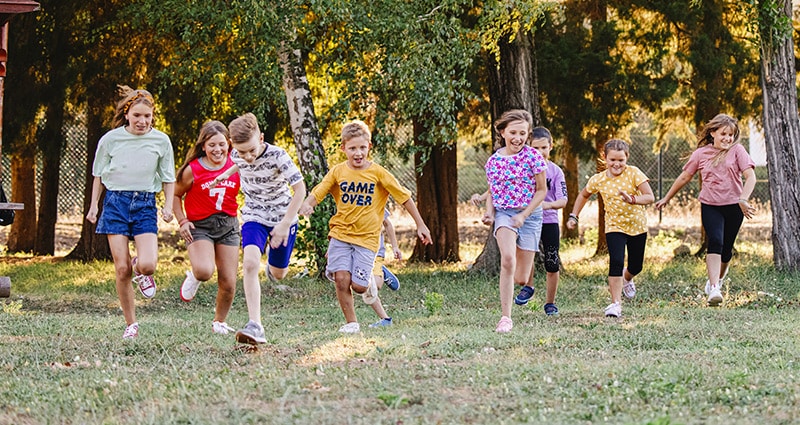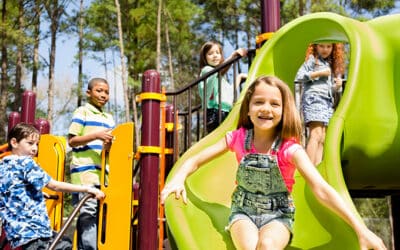Many fond memories are built at overnight summer camp. It’s a rite of passage in some families, developing resilience and independence.
With residential camps in full swing again this summer, we’ve collected some tips to make the experience safe and fun for your campers.
1. Make the Sleepaway Camp Decision
How do you know if your little one is ready to make the leap to a sleepaway summer camp? It depends on the child, but the average age is between 7 and 9.
You’ll know sleepaway camp success is likely if your child:
- enjoys sleepovers with friends and relatives
- likes to stay busy with activities all day
- can perform basic self-care, including showering and brushing hair and teeth without assistance
Making the choice of where to go can be an even bigger challenge. Kids often have the best experiences when they’re with at least one friend they already know. Rely on other parents’ recommendations for choosing the right camp for your child.
2. Packing List Considerations
The earlier you start packing, the easier it can be. Enlisting your camper to help pack can make it easier on them once they’re at camp, since they’ll know where everything has been stashed. Do a trial run of living out of a suitcase or duffle bag to help your camper get the feel of it.
Your camp will provide a specific list of what’s allowed and what is prohibited. The basics are pretty standard. Be sure to label everything with your child’s name.
- Headgear, such as bandanas, sun hats or caps, sunglasses, eyeglasses if needed, swimming goggles, face masks
- Clothes, including T-shirts, shorts, long pants or jeans, jacket, raincoat, sweatshirt, swimsuit and rash guard, pajamas, underwear
- Footwear, including tennis shoes, hiking boots, flip flops or other shower/swim shoes, socks
- Gear and comfort items, including books or magazines, compass, battery-operated fan, flashlight, batteries, water bottle and mess kit, notepaper, pens or pencils, envelopes and stamps
- Bed and bath, including towels (bath, hand and beach), sleeping bag, pillow and pillowcases, laundry bag
- Bathroom supplies, including shower caddy, comb or brush, shampoo and conditioner, hand sanitizer, toothbrush and toothpaste, deodorant, sunblock, insect repellent, anti-itch cream, feminine products or shaving gear if needed
- Regular medication, such as ADHD medication or asthma inhalers. Depending on your camp’s policy, some medication may need to be handed to a camp nurse directly. Be sure your child knows how to access them.
3. Know the Safety Rules
Make sure your camper is fully briefed on safety expectations, especially water safety. Kids should only be in the pool or bodies of water with adults supervising. Listen to our ParentingU podcast episode about water safety from the perspective of an ER doctor.
The buddy system is a given. Kids should know to stay with at least one friend when walking around camp between activities.
Kids should keep their shoes on, even while they shower. Practice showering in flip flops a few times at home to get used to the sensation. Wearing shoes while walking outside at camp is important to prevent any puncture injuries to the feet from stepping on rocks, sticks or other debris found in nature.
4. Sunblock and Bug Spray
The best sunblock for summer camp is the type that your child will use reliably. Spray or stick styles can be good for ease of application, but the best sun protection comes from a water-resistant, broad-spectrum, high SPF lotion. When swimming, a rash guard can provide sun protection more easily.
Unfortunately, bugs and camp go together like peanut butter and jelly. Insect repellent can ease your camper’s irritation due to pesky mosquitoes and flies. The best type of bug spray will depend on where the camp is being held. The Centers for Disease Control & Prevention recommends using repellents that include DEET or Picaridin. Packing some anti-itch cream and teaching your child how to apply it can provide relief if the spray fails or is forgotten.
5. Nutrition and Hydration at Camp
Heat and high humidity are hallmarks of Gulf South summers. Even if your camper is in a higher and drier location, it’s critical that they stay hydrated and understand the importance of drinking a lot of water all day, every day, at camp.
Camps usually serve food that appeals to children and meets their nutritional needs, which are often higher due to lots of activity and summer heat. Your camper should know how important it is to eat well to maintain their energy levels, even if the foods aren’t their favorites. They should also know to never eat anything they find in the woods (no matter how delicious a berry or nut looks).
6. Get Ahead of Homesickness
Missing family and the comfort of home is expected. Camp staff have plans to help kids work through it. Talking about the range of emotions beforehand can help. Let your camper know they’re ready for the adventure and that homesickness is normal and temporary. Bringing a comfort item from home can help ease the transition.
Kid-sickness, or missing your camper while they’re away, may hit you a little harder. Make sure you stay positive while preparing for camp and during drop off, so it doesn’t make your child more nervous.
With a lot of preparation and packing, your little one will be ready for a safe and fun camping experience they’ll always remember.




